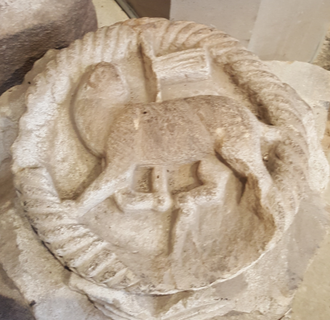Sunday Reflection with Canon Robin Gibbons - 16 May 2021

Medieval Agnus Dei from Bolton Priory Wharfedale.
Seventh Sunday after Easter
I make a big confession here, I have never really bought the line about how evil Judas was, nor will I join in the usual chorus of traitor, if anything I can identify with him, there is so much in his story (and we know it through his detractors) that hinges upon what I can call gossip, at least in the election of Matthias there is a more nuanced comment, Peter speaks: ""My brothers, the scripture had to be fulfilled which the holy Spirit spoke beforehand through the mouth of David, concerning Judas, who was the guide for those who arrested Jesus. He was numbered among us and was allotted a share in this ministry. (Acts 1: 16,17)
Peter also goes on to give a different account of his death, connecting it with falling rather than suicide.
There is less unpleasantness here in this account of Acts I, I feel less sullied by the bad taste of condemnation from those who should know better, I pick up these important words: Judas was' guide' for those who arrested Jesus, 'numbered' amongst the disciples, 'shared' in ministry, and as Peter says he 'turned away to go to his own place'. Is there sympathy there? There ought to be, for Peter's track record is just as appalling, what about the rest of those men who hid, frightened and shut up or despairing, so left the arena of ministry. No my friends, 'this will not do!' Judas deserves some kindly reflection. Let us begin with the prayer of Jesus in John 11. Yes, in todays Gospel John puts into the mouth of Jesus the words none of them was lost except the 'son of destruction', but like many parts of our Scriptures this phrase is to make a point, and we have to be careful, this does not necessarily refer to one person, it can be translated 'son of perdition', one doomed to destruction, but it also refers to the lawless one, the Antichrist. Some exegetes tell us that this phrase used about Judas reveals that though he loved the Christ, he rejected him and so lost the chance of salvation.
A bit too neat I think! The terrier in me wants to worry away at this and place it alongside the understanding of a Christ who loves all. The High Priestly prayer of John 17 has Jesus adding a small coda to that term, he says; 'in order that the scripture might be fulfilled'. (Jn 17:12b) Something in me sees that as a really crucial piece of evidence, how we interpret it may or may not help Judas, but it puts him into the plans of God, and with that I pause an remind myself that neither you not I are privy to that fullness of vision and information. It is very easy, isn't it to blame others, to dump on groups of people the projections of our own unresolved fears. Those in ministry need to beware of courting popular opinion, they also need to reflect on the virtue of integrity, for this is key to following Christ, the whole of our ministry as lay and clerical, the vision we need to share with the world is based on truth, a gift given through the express charism of the Advocate: "And I consecrate myself for them, so that they also may be consecrated in truth:
"I pray not only for them, but also for those who will believe in me through their word, so that they may all be one, as you, Father, are in me and I in you, that they also may be in us, that the world may believe that you sent me". (Jn 17:20,21)
Maybe, just maybe if we reflect on the maligned Judas a little humility might fall on our shoulders, he is both the projections of our own fears about God and the hope that somewhere in life evil is vanquished, but also of our capacity to blame others. In the Gospels none of those disciples are blameless and much laid at Judas feet is simply a combination of different problems, gossip in fact, but then we are never blameless, a good examination of our own conscience might throw up many things that Judas has been blamed for down the centuries. I don't expect many will agree with me, but if these Sunday readings just make us pause a little and think of our own attitudes to Christ and also to forgiveness we are well on the way to opening ourselves to the Advocate, who will help us!
Lectio
From the Ascetical Homilies of St Isaac the Syrian
On prayer…
But since we say that God is plenteous in mercy, why is it that when amidst temptations we unceasingly knock and pray, we are not heard and He disregards our prayer? This we are clearly taught by the Prophet when he says, `The Lord's hand is not little, that it cannot save; nor is He heavy of hearing, that He cannot hear; but our sins have separated us from Him, and our iniquities have turned His face away, that He doth not hearken.' Remember God at all times, and He will remember your whenever you fall into evils.
From an Article in the Independent
Why Judas Iscariot may actually have been more of a saint than a sinner
Perhaps we could cut Iscariot a little slack - because if the Bible isn't clear on his character, then how can we be?
Katie Edwards
Thursday 24 March 2016
'… none of the apostles are presented in a heroic light in the text since they all desert Jesus (26:56). Indeed, most of the gospels suggest that Judas's betrayal is essential to the fulfilment of God's plan (John 13:18, John 17:12, Matthew 26:23-25, Luke 22:21-22, Matt 27:9-10, Acts 1:16, Acts 1:20). The Gospel of John also suggests that Jesus knows of Judas's betrayal and allows it (John 6:64 and 13:27-28) but, far less sympathetically, that Judas also was a liar and a thief (12:1-6).
In Mark (14:10-11), meanwhile, it isn't clear that money is a motivation for his betrayal of Jesus, while the gospels of Luke and John both agree that Judas betrays Jesus because Satan enters into him, suggesting perhaps that Judas may not have been acting of his own free will (Luke 22:3-6; John 13:27).
While Judas may never be fully rehabilitated from his reputation as treacherous villain, perhaps we could cut him a little slack - if the Bible isn't clear on his character, then how can we?'


















